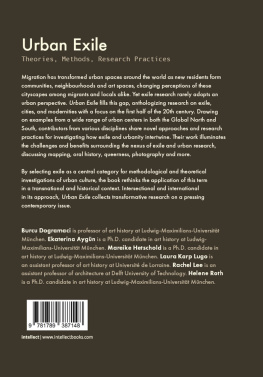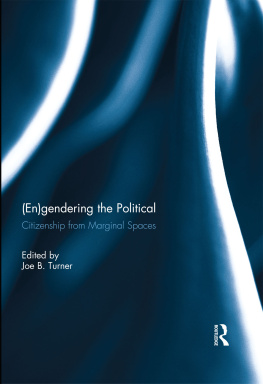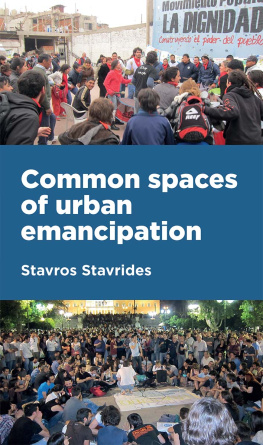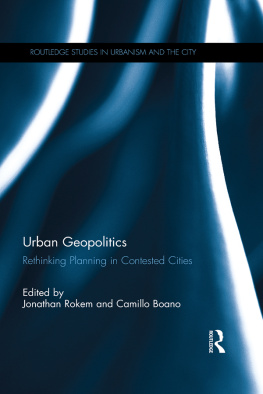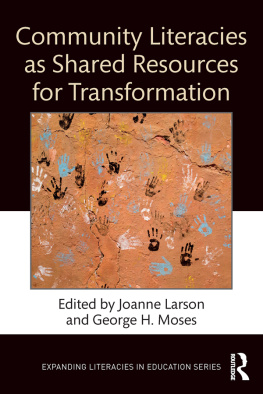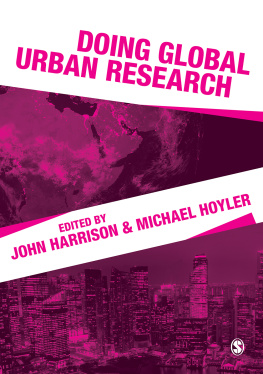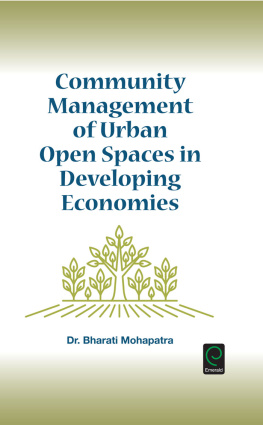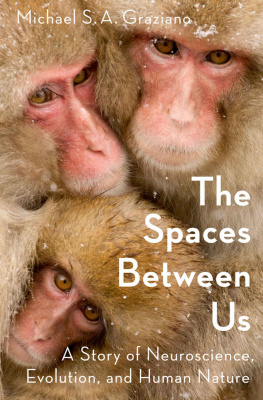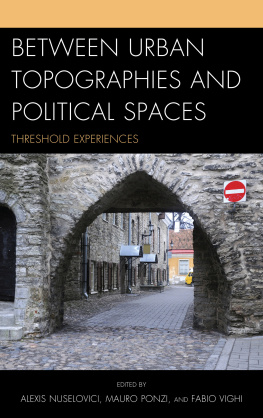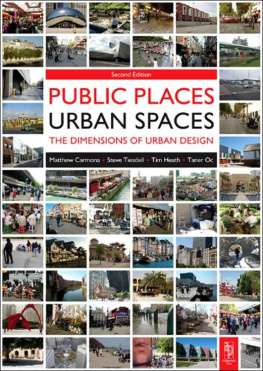Marginal SPACES
Comparative Urban and Community Research
Series Editor, Michael Peter Smith
Volume 1 Power, Community and the City
Volume 2 Pacific Rim Cities in the World Economy
Volume 3 Breaking Chains: Social Movements and Collective Action
Volume 4 After Modernism: Global Restructuring and the Changing Boundaries of City Life
Volume 5 Marginal Spaces
Volume 6 Transnationalism From Below
Volume 7 City and Nation: Rethinking Place and Identity
Marginal SPACES
Comparative Urban and Community Research
VOLUME5
edited by Michael Peter Smith
First published 1995 by Transaction Publishers
Published 2017 by Routledge
2 Park Square, Milton Park, Abingdon, Oxon OX14 4RN
711 Third Avenue, New York, NY 10017, USA
Routledge is an imprint of the Taylor & Francis Group, an informa business
Copyright 1995 by Taylor & Francis.
All rights reserved. No part of this book may be reprinted or reproduced or utilised in any form or by any electronic, mechanical, or other means, now known or hereafter invented, including photocopying and recording, or in any information storage or retrieval system, without permission in writing from the publishers.
Notice:
Product or corporate names may be trademarks or registered trademarks, and are used only for identification and explanation without intent to infringe.
Library of Congress Catalog Number: 95-9319
Library of Congress Cataloging-in-Publication Data
Marginal spaces / edited by Michael Peter Smith.
p. cm. (Comparative urban and community research, ISSN 0892-5569 ; v. 5)
Includes bibliographical references.
ISBN 1-56000-812-1 (alk. paper)
1. Community development, UrbanUnited StatesCase Studies. 2. Urban poorUnited StatesPolitical activityCase studies. 3. Marginality, SocialUnited StatesCase studies. 4. Land use, UrbanPolitical aspectsUnited StatesCase studies. I. Smith, Michael P. II. Series.
HN90.C6M37 1995
307.1 '412'0973dc20
95-9319
CIP
ISSN: 0892-5569
ISBN 13: 978-1-56000-812-5 (pbk)
Contents
Michael Peter Smith
Corey Dolgon, Michael Kline, and Laura Dresser
Talmadge Wright
Christopher Mele
Alma H. Young and Jyaphia Christos-Rodgers
Carol Zabin
Acknowledgment
"The Stimulus of a Little Confusion" by Edward W. Soja, which appeared in After Modernism, volume 4 of Comparative Urban and Community Research, was originally published by the Centrum voor Grootstedelijk Onderzoek (Center for Metropolitan Research) of the University of Amsterdam (1991) as part of its series of "Texts of a Special Lecture." Sponsored by the city of Amsterdam, the CGO supports a program of visiting professors of urban research. Professor Soja was a visiting professor in the spring of 1990 and presented a lecture on "The Changing Relation of City and Suburb in Los Angeles and Amsterdam," from which this more expansive essay derives. Due to an error made in the preparation of camera ready copy for volume 4 this acknowledgment did not appear. Also inadvertently excluded was the following statement by Professor Soja: "Thanks to Leon Deben, Dick van der Vaart, and Jacques van de Ven, for sponsoring my stay in Amsterdam, along with the Department of Social Geography of the University of Amsterdam. Very special thanks also to Pieter Terhorst of the Department of Social Geography, who more than anyone else warmly and informatively shaped my understanding of Amsterdam."
Introduction
The Social Construction of Marginal Spaces
Michael Peter Smith
In reality, social space "incorporates" social actions, the actions of subjects both individual and collective, who are born and who die, who suffer and who act.
Henri Lefebvre, The Production of Space
Spatial practices by centers of wealth and power to legitimate their domination and marginalize, exclude, or contain dominated groups, keeping them "in their place," have been extensively studied in urban and community research. The literature on modernist and postmodernist urban development is replete with this themethe city envisaged as a mechanism of spatial exclusion, surveillance, and social control. A variety of critical theorists from Michel Foucault to Henri Lefebvre have been invoked by contemporary analysts of social space to give resonance and a theoretical gloss to this leitmotif (See, for instance, Soja 1989; see also Davis 1990, ).The postmodern sensibility has cast interesting light on the way in which language and discourse are used to construct and reproduce spatially distinct centers and margins. Yet once marginal spaces are socially constructed, the "inhabitants" of these spaces have shown a remarkable ability to act in ways that defy the regulatory intentions of their superordinates.
This capacity of marginal groups to refashion spaces of social control into sites of resistance was well recognized by the late Henri Lefebvre. After devoting a large portion of his influential work The Production of Space to the theme of capitalist domination of social space, Lefebvre (1991, 362) had this to say about resistance to domination in the everyday spatial practices of marginalized groups:
Let us now turn our attention to the space of those who are referred to by means of such clumsy and pejorative labels as "users" and "inhabitants." No well defined terms ... have been found to designate these groups. Their marginalization by spatial practices thus extends even to language. The fact is that the most basic demands of "users" (suggesting "underpriviledged") and "inhabitants" (suggesting "marginal") find expression only with great difficulty, whereas the signs of their situation are constantly increasing and often stare us in the face.... [T]he space of the everyday activities of users is a concrete one, which is to say subjective. As a space of "subjects" rather than of calculations, as a representational space, it has an origin, and that origin is childhood, with its hardships, its achievements, and its lacks.
Few researchers have taken up the challenge implict in this statement by mapping the subjectivity, and hence the power moves and power plays, embodied in the spatial practices of marginal groups. Put differently, few have studied the social construction of marginal spaces as spaces of resistance "from below." Two theoretically informed observers of the human condition who have done so exceptionally well, Michel de Certeau and James C. Scott, have provided us with useful models for the close study in daily life of what Scott terms "the weapons of the weak." De Certeau's (1984, xxiv) analysis of the practices of everyday life starts from the assumption that in today's fragmented societies the problem of the "subject" is not one of mere dissolution; rather, subjectivity is discernible in the reappropriations of social space made by its actual users. In his words, "[The] ways of reappropriating the product system... created by consumers, have as their goal a therapeutics for deteriorating social relations and make use of techniques of reemployment in which we can recognize the procedures of everyday practices." He concludes that to understand the workings of power a politics of such ploys should be developed. Scott (1985, 31-38) does precisely this in his richly textured and broadly Gramscian analysis of the forms of everyday resistance by peasants to the claims of superordinates and the state. He moves us well along the path toward an understanding of the politics of a wide variety of sociospatial ploysfor example, passive noncompliance, subtle sabatoge, and land squattingwhereby the "weak" encroach upon, mitigate, or deny claims upon them made by the "strong."




